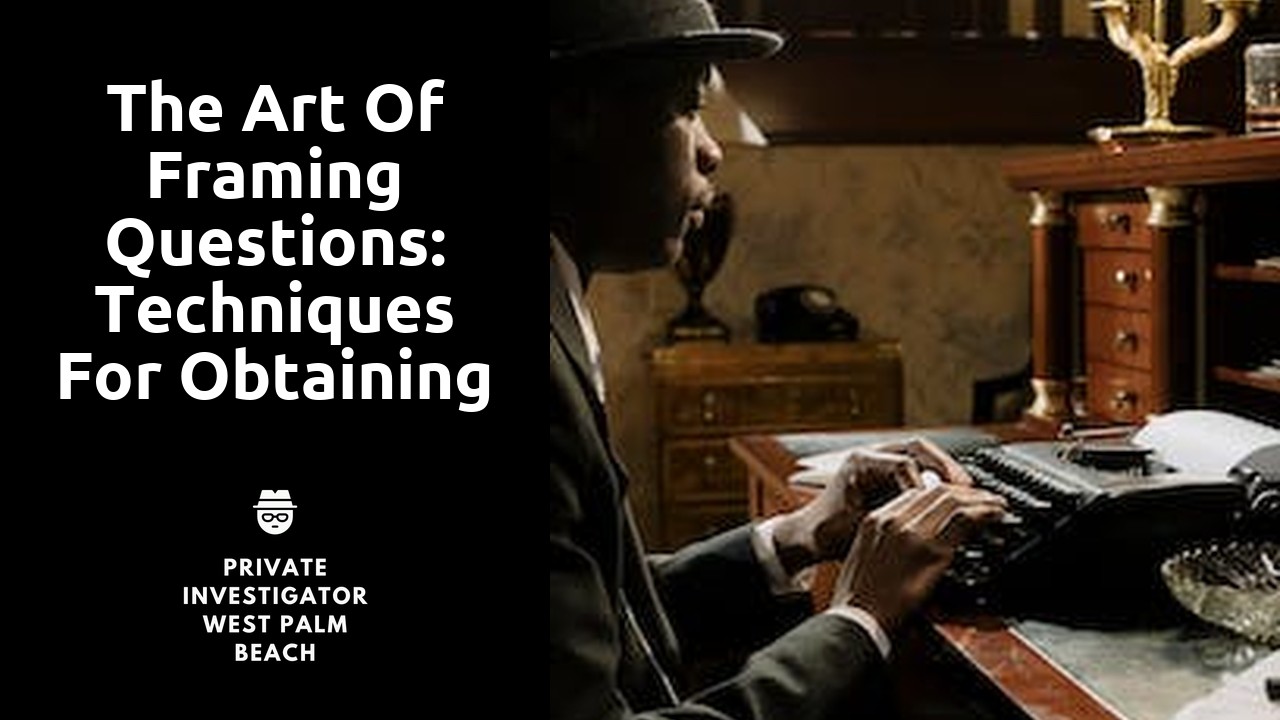
The Art of Framing Questions: Techniques for Obtaining Key Details
Uncovering Essential Insights: Mastering the Skill of Question Framing
The skill of question framing is a crucial element in uncovering essential insights. It is the art of asking thoughtful and strategic questions that elicit valuable information and deep understanding. When mastered, this skill can lead to a deeper level of analysis and interpretation, allowing individuals to gather the necessary data and uncover hidden details that may have otherwise gone unnoticed. By honing their ability to frame questions effectively, professionals can enhance their decision-making processes, problem-solving skills, and overall communication efficacy.
One key aspect of mastering the skill of question framing is understanding the power of precision. Crafting inquiries with precision allows individuals to extract specific and targeted information, avoiding vagueness or ambiguity. Precision in question framing ensures that both the questioner and the respondent are on the same page, leading to a more focused and fruitful conversation. Skillful question framing not only helps to clarify objectives and goals but also facilitates a deeper exploration of complex topics, leading to a broader and more comprehensive understanding of the subject matter at hand.
Crafting Inquiry with Precision: Unlocking the Power of Effective Questions
Crafting Inquiry with Precision: Unlocking the Power of Effective Questions
Asking effective questions is a skill that can greatly enhance communication and foster deeper understanding. It is not simply about asking any question, but rather about crafting inquiries with precision. This involves carefully considering the purpose of the question, the context in which it is being asked, and the desired outcome.
One key aspect of crafting effective questions is to ensure they are clear and concise. Ambiguity can result in confusion and hinder the flow of communication. By framing questions in a precise manner, we can elicit specific information and encourage thoughtful responses. In addition, using language that is accessible and easily understood by all participants is vital in order to cultivate an inclusive and engaging conversation.
Probing for Clarity: Enhancing Communication through Skillful Questioning
Probing for clarity is an essential skill that can greatly enhance communication. By asking skillful questions, we can uncover hidden details, clarify confusing information, and ensure a thorough understanding of the topic at hand. The key to successful probing lies in the art of questioning, as it allows us to dig deeper and extract crucial information that may not have been initially evident.
Effective questioning requires us to be mindful of our tone and approach. It is important to create a safe and non-threatening environment, where the person being questioned feels comfortable and encouraged to share their thoughts openly. By using a tone that is curious rather than confrontational, we can foster a constructive dialogue that leads to greater clarity and understanding. Additionally, framing our questions in a way that is precise and concise helps to avoid ambiguity and ensures that our queries are easily understood by all parties involved. Probing for clarity is not only a valuable skill in professional settings but also in our everyday conversations, as it allows us to bridge communication gaps and deepen our understanding of the world around us.
Navigating Conversations: Strategies for Extracting Crucial Information
Navigating conversations can be a complex task, especially when it comes to extracting crucial information. To successfully extract the information you need, there are a few strategies that can be employed. First and foremost, active listening is key. By truly listening to the other person, you can pick up on subtle cues and nonverbal communication that may provide valuable insights.
Additionally, asking open-ended questions can be highly effective in extracting crucial information. Open-ended questions allow the other person to provide detailed responses rather than simple yes or no answers. This can promote a deeper level of understanding and encourage the other person to share more information. Overall, navigating conversations and extracting crucial information requires a combination of active listening and strategic questioning techniques. By employing these strategies, you can effectively gather the information you need in any conversation.
The Science of Inquiry: Unveiling Hidden Details through Skillful Questioning
Effective questioning is not only an art but also a science. It is a skill that can be honed and mastered to uncover hidden details and gain deeper understanding. By asking the right questions, we can unveil insights that may not be immediately apparent. This scientific approach to inquiry requires precision, careful observation, and a deep curiosity to explore beyond the surface level.
In the pursuit of unveiling hidden details, skillful question framing is crucial. It goes beyond simply asking open-ended or closed-ended questions. The science lies in crafting inquiry that is specific, targeted, and purposeful. By doing so, we engage in proactive and intentional conversations that lead us toward the discovery of valuable information. Through the art of question framing, we can unlock doors to deeper understanding and enrich our interactions with others.
Empowering Dialogue: Harnessing the Art of Question Framing for Deeper Understanding
Asking the right questions is a powerful tool in empowering dialogue and fostering deeper understanding. The art of question framing involves carefully crafting inquiries that provoke thoughtful and insightful responses. By mastering this skill, we can unlock the potential for more meaningful conversations and uncover hidden insights.
Effective question framing begins with precision. It is essential to carefully consider the purpose of the question and the desired outcome. Rather than asking vague or generic questions, we should strive to be specific and concise. By doing so, we encourage others to provide detailed and focused responses, leading to a deeper exploration of the topic at hand. Additionally, precision in question framing helps to clarify any ambiguity and facilitates clearer communication between all parties involved.
Related Links
Improving Questioning Skills: Strategies for Eliciting Honest AnswersOpen vs Closed-Ended Questions: Which is Best for Gathering Information?